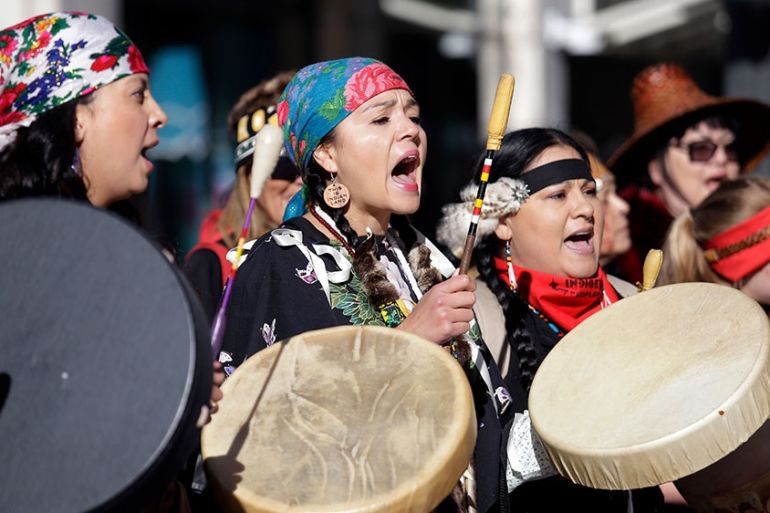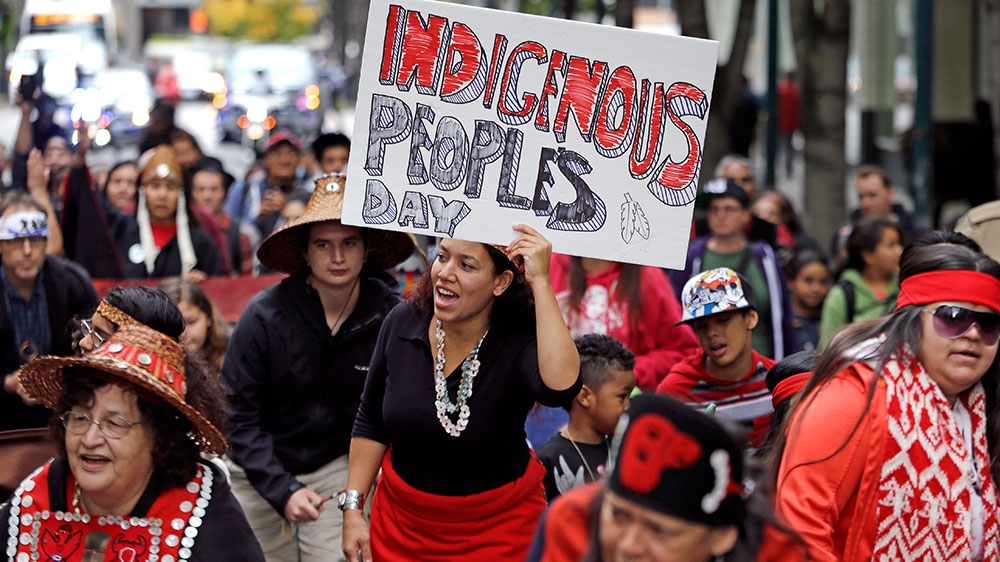Which US states are celebrating Indigenous Peoples’ Day?
Several US states and cities have done away with Columbus Day celebrations in deference to Native Americans.

A handful of US states are celebrating their first Indigenous Peoples’ Day on Monday as part of a trend to move away from a day honouring Christopher Columbus.
From Minnesota to Vermont, at least five states and Washington, DC, have done away with Columbus Day celebrations in deference to Native Americans, though the federal Columbus Day remains in place. Other states celebrate Columbus Day, but have also symbolically recognised Indigenous Peoples’ Day either on the same day or another one.
Keep reading
list of 4 itemsWhy are protests against France raging in New Caledonia?
‘No choice’: India’s Manipuris cannot go back a year after fleeing violence
Photos: Indigenous people in Brazil march to demand land recognition
Since 1992, Native American advocates have pressed states to change Columbus Day to Indigenous Peoples’ Day over concerns that Columbus helped launched centuries of genocide against indigenous populations in the Americas.
New Mexico is marking its statewide Indigenous Peoples’ Day with an invocation by several tribal leaders in unison in their native languages. There also will be a parade and traditional dances at the Indian Pueblo Cultural Center in Albuquerque.
“I think it’s great and it’s about time,” said All Pueblo Council of Governors Chairman E Paul Torres, a member of Isleta Pueblo in New Mexico.
Democratic New Mexico state Representative Derrick Lente of Sandia Pueblo, the sponsor of his state’s legislation that changed the holiday to Indigenous Peoples’ Day, said the day allows reflection on the United States‘s complicated history.
Adopting the holiday, he said, provides some restorative justice for indigenous communities.

State offices in Maine also are scheduled to close for the holiday. Maine, home to four federally recognised tribes, ditched Columbus Day in favour of Indigenous Peoples’ Day with an April bill signing by Democratic Governor Janet Mills.
She said at the time she hoped the move would represent a move “toward healing, toward inclusiveness”. Tribes in Maine have had a rocky relationship with the state government over the years, and the Penobscot and Passamaquoddy tribes withdrew representatives to the Legislature in 2015, when Republican Governor Paul LePage was in office.
Online, many shared photos of celebrations and commemorations across the US.
“I’m indigenous 365 days a year but we’ll let today be extra special,” tweeted one Twitter user.
I’m indigenous 365 days a year but we’ll let today be extra special ♥️ #IndigenousPeoplesDay #ColumbusWho? pic.twitter.com/gmN8aG6I6V
— kamarin🌼 (@kamgleason) October 14, 2019
Another Twitter user said: “I’m proud everyday to be Native but today, we actually get some recognition for overcoming such tragedies that were done to our people throughout history. American history! #educateyourself #IndigenousPeoplesDay.
I'm proud everyday to be Native but today, we actually get some recognition for overcoming such tragedies that were done to our people throughout history. American history! #educateyourself #IndigenousPeoplesDay ✊🏽
— RENegade_24 (@RENegade_24) October 14, 2019
Lakota/Mohawk journalist Corinne Oestreich-Rice of PowWows.com took to AJ+’s Twitter account to explain how the movement to recognise Indigenous Peoples’ Day began.
“Though Native Americans have probably discussed the idea of an #IndigenousPeoplesDay since at least the 1970s, the idea gained popularity in 1992 when a group of Bay Area Natives pushed back on a planned reenactment of Columbus’s arrival,” Oestreich-Rich tweeted.
“As Indigenous people of an occupied land, they expect and demand the recognition and respect of those who occupy it – and an understanding of important issues in Indian Country,” she said.
Why do Natives want a day celebrating their cultures? As Indigenous people of an occupied land, they expect and demand the recognition and respect of those who occupy it – and an understanding of important issues in Indian Country. (5/11) pic.twitter.com/oAk04aBcLc
— AJ+ (@ajplus) October 14, 2019
“In sum, #IndigenousPeoplesDay is about more than a land acknowledgment from your company or city hall. It needs to be about the willingness to work with the Indigenous people of the land you occupy, involving them directly in everything. Without that, words fall short.”
Happy #IndigenousPeoplesDay!
If you have a sec, watch our @beardfoundation-nominated documentary on Native American cuisine, the oldest cuisine of the land we today call "America."
You'll learn a lot – we promise! @ajplus pic.twitter.com/DwqPLGOqZO
— Yara Elmjouie (@yelmjouie) October 14, 2019